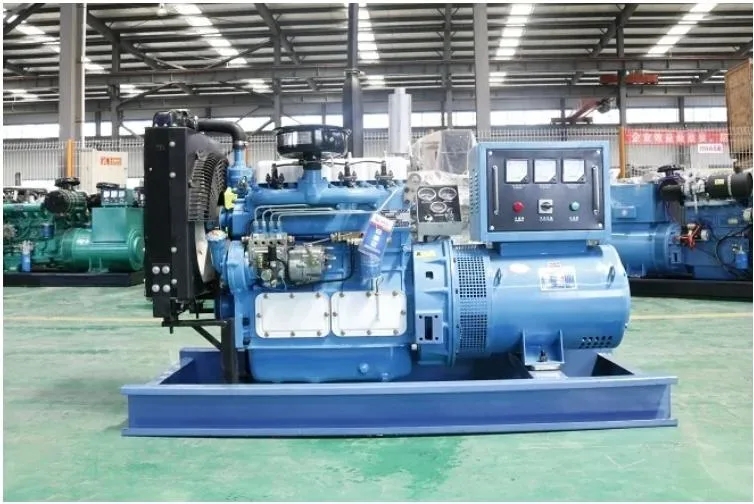Introduction
In today's modern world, reliable power supply is essential for various industries, businesses, and everyday activities. When it comes to ensuring uninterrupted power supply, diesel generators play a crucial role. These generators are known for their robustness, reliability, and efficiency, making them a popular choice for load sharing applications. In this article, we will explore the benefits and applications of diesel generators for load sharing, as well as the key considerations for maximizing their efficiency and reliability.
Understanding Load Sharing
Load sharing is a mechanism where multiple power sources work together to supply power to a common electrical load. In this setup, the power generated by each source is synchronized and distributed based on the load demand. Load sharing helps in optimizing the utilization of available power sources, improving efficiency, and ensuring redundancy in case of failures.
Diesel generators are commonly used in load sharing applications due to their ability to provide reliable power output over an extended period. By combining multiple diesel generators in a load sharing configuration, businesses can ensure continuous power supply even during peak demand periods or in case of a generator failure.
Benefits of Diesel Generators for Load Sharing
1. Reliability: One of the key advantages of diesel generators for load sharing is their reliability. Diesel engines are known for their robust construction and ability to operate continuously for long durations. This makes them ideal for critical applications where uninterrupted power supply is essential.
2. Fuel Efficiency: Diesel generators are more fuel-efficient compared to other types of generators, such as gasoline or natural gas generators. Industrial Diesel Generator helps in reducing operating costs and makes diesel generators a cost-effective option for load sharing applications.
3. Scalability: Diesel generators can be easily scaled up or down based on the load requirements. By adding or removing generators from the load sharing configuration, businesses can adapt to changing power demands and ensure optimal utilization of resources.
4. Quick Start-Up Time: Diesel generators have a quick start-up time, allowing them to respond rapidly to sudden changes in load demand. This feature is crucial for maintaining a stable power supply and preventing disruptions in critical operations.
Applications of Diesel Generators for Load Sharing
1. Data Centers: Data centers are facilities that require a constant and reliable power supply to ensure the uninterrupted operation of servers and IT equipment. Diesel generators are commonly used in data centers for load sharing to provide backup power during outages or grid failures.
2. Hospitals: Hospitals rely on continuous power supply to operate life-saving medical equipment, lighting, and HVAC systems. Diesel generators for load sharing play a vital role in ensuring that critical healthcare services are not disrupted during power outages.
3. Manufacturing Plants: Manufacturing plants often have high-power requirements that fluctuate throughout the day. Diesel generators can be used for load sharing to supplement the grid power and stabilize the electrical supply, ensuring smooth operations and preventing production losses.
4. Telecommunication Towers: Telecommunication towers need a reliable power supply to maintain connectivity and communication services. Diesel generators are deployed at remote tower locations for load sharing to provide backup power in case of grid failures or natural disasters.
Key Considerations for Maximizing Efficiency and Reliability
1. Regular Maintenance: Proper maintenance is essential to ensure the efficient operation and longevity of diesel generators. Regular servicing, oil changes, and inspections should be performed as per the manufacturer's guidelines to prevent breakdowns and ensure optimal performance.
2. Fuel Quality: The quality of diesel fuel used in generators can impact their efficiency and reliability. It is important to use high-quality fuel and ensure proper storage to avoid contamination and degradation of fuel, which can lead to engine issues.
3. Synchronization: In a load sharing setup, proper synchronization of multiple generators is crucial to prevent power imbalances and ensure a stable electrical supply. Synchronization panels and controllers should be used to coordinate the operation of generators and maintain frequency and voltage levels within acceptable limits.
4. Load Distribution: Efficient load distribution among multiple generators is essential to optimize fuel consumption and prevent overloading of individual units. Load shedding mechanisms and automatic load controllers can be employed to balance the load across generators and prevent over-exertion.
5. Remote Monitoring: Remote monitoring systems allow operators to monitor the performance of diesel generators in real-time and receive alerts in case of any issues or failures. Remote monitoring helps in proactive maintenance planning, troubleshooting, and ensuring the reliability of the power supply.

Conclusion
Diesel generators are a reliable and efficient power source for load sharing applications across various industries. By leveraging the benefits of diesel generators, businesses can ensure continuous power supply, improve energy resilience, and protect critical operations from disruptions. To maximize the efficiency and reliability of diesel generators for load sharing, proper maintenance, fuel quality, synchronization, load distribution, and remote monitoring are essential considerations. With careful planning and implementation, diesel generators can play a vital role in ensuring uninterrupted power supply and business continuity in today's dynamic operating environment.
